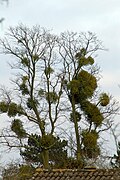Ecological niche
Ecological niche refers to the role and position a species has in its environment; how it meets its needs for food and shelter, how it survives, and how it reproduces. A niche includes all of its interactions with the biotic and abiotic factors of its environment. The concept is central to the study of ecology and biodiversity, as it helps to understand how species coexist and how they affect their habitats.
Definition[edit]
The term "niche" was first coined by the naturalist Joseph Grinnell in 1917, but it was G. Evelyn Hutchinson who introduced a more formal concept in 1957. Hutchinson described the niche as an "n-dimensional hypervolume", where the dimensions are environmental conditions and resources that define the requirements of an individual or a species to practice its way of life, more specifically its survival and reproduction.
Types of Niches[edit]
There are several types of ecological niches, including:
- Fundamental Niche: This is the potential mode of existence of a species, given the absence of biotic interactions. It represents the full range of conditions and resources under which a species can survive and reproduce.
- Realized Niche: This is the actual mode of existence of a species, which results from its adaptations as well as competition and other biotic interactions. The realized niche is typically a subset of the fundamental niche.
- Niche Differentiation: This occurs when competing species use the environment differently in a way that helps them to coexist.
Niche Construction[edit]
Niche construction is the process by which an organism alters its own (or another species') environment, often but not always in a manner that increases its chances of survival. Beavers, for example, create dams that alter the flow of rivers, creating new niches for various aquatic species.
Importance in Ecology[edit]
Understanding the ecological niche is crucial for understanding the distribution and abundance of species. It helps ecologists to predict how species will respond to changes in their environment, including those induced by human activities. It also plays a key role in conservation biology, helping to identify which habitats are most important to protect in order to preserve biodiversity.
Human Impact[edit]
Humans have a significant impact on the ecological niches of species worldwide. Through activities such as deforestation, pollution, and climate change, humans can alter the niches available to other species, often to their detriment. Conservation efforts aim to mitigate these impacts by protecting natural habitats and restoring ecosystems.
See Also[edit]
-
Ecological_niche
-
Ecological_niche
-
Ecological_niche
-
Ecological_niche
-
Ecological_niche
-
Ecological_niche
-
Ecological_niche
-
Ecological_niche
-
Ecological_niche
-
Ecological_niche
Ad. Transform your life with W8MD's Budget GLP-1 injections from $75


W8MD offers a medical weight loss program to lose weight in Philadelphia. Our physician-supervised medical weight loss provides:
- Weight loss injections in NYC (generic and brand names):
- Zepbound / Mounjaro, Wegovy / Ozempic, Saxenda
- Most insurances accepted or discounted self-pay rates. We will obtain insurance prior authorizations if needed.
- Generic GLP1 weight loss injections from $75 for the starting dose.
- Also offer prescription weight loss medications including Phentermine, Qsymia, Diethylpropion, Contrave etc.
NYC weight loss doctor appointmentsNYC weight loss doctor appointments
Start your NYC weight loss journey today at our NYC medical weight loss and Philadelphia medical weight loss clinics.
- Call 718-946-5500 to lose weight in NYC or for medical weight loss in Philadelphia 215-676-2334.
- Tags:NYC medical weight loss, Philadelphia lose weight Zepbound NYC, Budget GLP1 weight loss injections, Wegovy Philadelphia, Wegovy NYC, Philadelphia medical weight loss, Brookly weight loss and Wegovy NYC
|
WikiMD's Wellness Encyclopedia |
| Let Food Be Thy Medicine Medicine Thy Food - Hippocrates |
Medical Disclaimer: WikiMD is not a substitute for professional medical advice. The information on WikiMD is provided as an information resource only, may be incorrect, outdated or misleading, and is not to be used or relied on for any diagnostic or treatment purposes. Please consult your health care provider before making any healthcare decisions or for guidance about a specific medical condition. WikiMD expressly disclaims responsibility, and shall have no liability, for any damages, loss, injury, or liability whatsoever suffered as a result of your reliance on the information contained in this site. By visiting this site you agree to the foregoing terms and conditions, which may from time to time be changed or supplemented by WikiMD. If you do not agree to the foregoing terms and conditions, you should not enter or use this site. See full disclaimer.
Credits:Most images are courtesy of Wikimedia commons, and templates, categories Wikipedia, licensed under CC BY SA or similar.
Translate this page: - East Asian
中文,
日本,
한국어,
South Asian
हिन्दी,
தமிழ்,
తెలుగు,
Urdu,
ಕನ್ನಡ,
Southeast Asian
Indonesian,
Vietnamese,
Thai,
မြန်မာဘာသာ,
বাংলা
European
español,
Deutsch,
français,
Greek,
português do Brasil,
polski,
română,
русский,
Nederlands,
norsk,
svenska,
suomi,
Italian
Middle Eastern & African
عربى,
Turkish,
Persian,
Hebrew,
Afrikaans,
isiZulu,
Kiswahili,
Other
Bulgarian,
Hungarian,
Czech,
Swedish,
മലയാളം,
मराठी,
ਪੰਜਾਬੀ,
ગુજરાતી,
Portuguese,
Ukrainian










